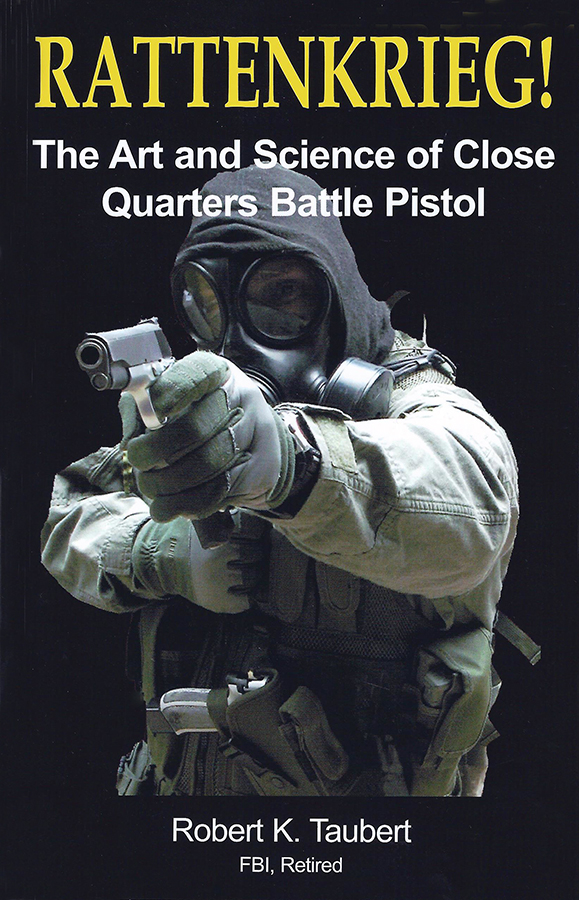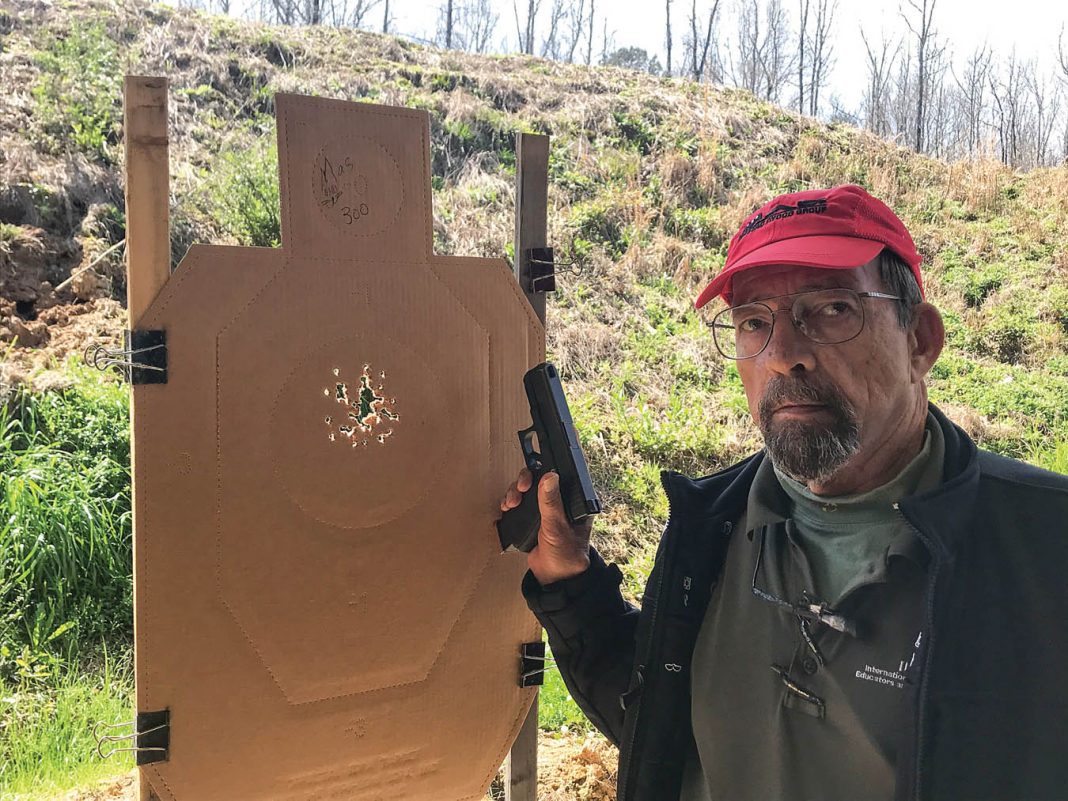Subtitled “The Art and Science of Close Quarters Battle Pistol,” “Rattenkrieg” draws its main title from a word the Germans coined for the vicious “rat war” of the Stalingrad campaign. The author, Bob Taubert, is better known by his pen name of “Bob Pilgrim” because he began writing when he worked for the FBI. Anyone who has worked for a large organization – dot-mil, dot-gov, or commercial – understands how that goes. Today, well into an honorably earned retirement, he is out of that particular closet. 
I’ve met Bob, and shot with him, and I can tell you he’s awfully good. In a long, “been there/done that” career, he has absorbed a great deal of advanced training from authoritative sources, and he distills it well in “Rattenkrieg.”
This book is an excellent compendium of current pistolcraft doctrine from many sources. Bob takes a very analytical approach, explaining where each technique comes from, and dispassionately listing its strong points and weak points. The book is an excellent overview for new shooters, and a very useful review for the master shooter. Few books can encompass both ends of the bell curve as well as this one.
What I particularly like about Taubert’s approach is something a lot of writers can learn from, whether or not they have any interest in firearms. That approach is to explain the technique clearly, along with how and why it was developed, and to present it non-judgmentally. Clearly, Bob Taubert has his own preferences…but instead of touting those and dissing the others, he explains them all without prejudice and lets the reader decide.
It’s a writing approach that serves the reader well, whether the book is about fighting with guns or how to raise prize-winning roses.
Recommended reading. Source is Saber Press, which offers other titles by qualified authors which many who read this blog will find of great interest.



Tell him to provide it as an e-book too!
I want.
I’ve read Rattenkrieg. I concur with your assessment of the book. Bob has had an amazing career in the military and LE. This is a must read for both students and instructors.
I could be wrong, but I understand authors don’t choose book titles. What is it with the gun world touting Nazi references? First of all, they lost. Second, they were a Satanic killing machine responsible for 10’s of millions of deaths in all sorts of hideous manners. To me it would be like someone publishing a business book and calling it “Arbeit macht frei”. Sick.
Thanks,Mas, looks like I need to add to my reading list.
Very interesting,
By the sounds of things, this one is worth a read on the grounds of writing style alone. As a fan of informative/how to literature I must say that the approach mentioned here by Mas would be most refreshing. As a plus, the title is phenomenal and fun to say three times fast.
Give it a try!
I not too long ago saw a post on Larry Vicker’s Facebook memorializing the achievements of a former SS soldier, who some how managed to sneak into the US and hid his past to join the US SOF. Kind of like von Braun and his ilk, except von Braun didn’t have to sneak in. I guess in time, all things become glossed over. The obscene rationalized into the palatable. The title of this book is terrible, any way you cut it.
Mas, we can ask the local libraries to stock copies of “Rattenkrieg.” Likely these books will get worn out pretty fast, too. The handgun has been particularly a special weapon in solving CQB hostage scenarios. Special Forces like Delta and the Seals have traditionally been regarded as among the best at liberating hostages. The FBI HRT and other LE groups seem to take something of a different approach, but may get comparable results. Robert K. Taubert’s combination of considerable military training experience and combat time, as well as his vast LE expertise, afford a uniquely illuminating learning opportunity regarding the handgun and CQB. Thanks for telling us about this book, thanks to Mr. Taubert for his considerable service, and God bless the USA. These are surely the most unsettling times here since 1861.
Folks, let’s not read too much into the “Rattenkrieg” title. It simply means a particularly vicious, kill or be killed, often close quarters urban combat. “Blitzkrieg,” for “lightning war,” was coined by the same people and is to this day common parlance in discussion of everything from military tactics to advertising campaigns and political campaigns.
Mas,
I keep getting an Error 404 from the Saber Press link.
Sure, Mas, and it sounds like a valuable book. Indeed I will probably buy it.
But the title virtually guarantees, for example, that a lawyer, scholar, or public official will not cite the book as an reference in a court brief, article, or white paper about defensive shooting. And thus its expertise will be drawn to the attention of fewer people.
With an ex-FBI author, it didn’t have to be that way. Bit of a shame.
Lorenzo, try: http://www.sabergroup.com/
I first met Bob Taubert back in the late 1980s, we were both shooting in the same pistol matches and he was then head of the FBI R&D division. We had intersting discussions about the FBI ammo tests and other things.
I have to agree about the background of techniques being important. Over the decades I’ve run into descriptions of techniques that left me wondering why in the world someone would do such a thing. I’d sometimes later discover the origins of the technique and why it would makes sense under those cirumstances. It does matter.
About the title: German does not equal Nazi. We still listen to the music of various German composers and read German authors (fairy tales included). So far as I know, Organische Chemie is still the bedrock of organic chemistry studies.
Rattenkrieg is a German word, and it would be German regardless of who controlled the country from 1933 to 1945. Is Wayne Newton a NAZI because he sings Danke Shoen? WWII is over, you can stop fighting it now.
First, thanks to Mas for writing this review about RATTENKRIEG!, which is one of the titles published by my company Saber Press. I didn’t know he was writing the review, and only figured it out after searching the web after a significant spike in book sales! That’s how much influence Mas has in our community!
Second, after reading the comments I just wanted to clarify the choice of the title.
Bob Taubert is a man I have been fortunate to know for some years now, and who I am grateful to for providing me the opportunity to work with him on this book, his legacy project to the “Good Guys” in the world.
Rattenkrieg! was the title of Bob’s CQB training program for many years. When we first started discussing the book project, the title was one of the things we looked at. I was concerned that some people may misinterpret the title as being somehow “pro-Nazi.” Bob’s position was that it was a German soldier’s word coined to describe the type of close-quarter battle addressed in the book. It was, in fact, inspired by the incredible resistance the Germans encountered by Russian troops and armed citizens during the terrible fighting in Stalingrad.
So if I may, let me reassure anyone who finds the title offensive in any way that sometimes a word is just a word, and that the intent must be understood. Anyone who knows Bob Taubert will realize that he is anything BUT sympathetic to anything even closely resembling a fascist or national-socialist regime. I also have no doubt that had Bob been born earlier, his face would have been the last thing many a Wehrmacht soldier would have seen.
He’s that good. “Captain America good” in fact.
Mike Conti
Rattenkrieg, Rat War, or War of the Rats, or whatever words or title one wishes to use, it is descriptive of an actual urban terror in the history of warfare. A horrific scenario played out in the lives of real human beings, soldiers and civilians alike, who as this horror played out, probably could have given a rats##s the politics of either side, Nazism or Communism (just as despicable). One was there because their country called them, the other because it was their home. Both just wanted to survive the current situation they found themselves in.
America has been blessed. Our people have never been subjected to the unthinkable conditions that were present during the sieges that took place in Stalingrad, nor the ones we are seeing reported daily in the Middle East. We don’t know (yet) the terror of rockets raining on our cities like Israel does, our towns over-run, our friends and families tortured and killed because our religion is not to be tolerated.
No, we are so above the reality of daily, without ceasing threat of attack on our towns, villages and, yes, our on homes, that those “foreign” people confront, we pontificate semantics.
I fervently pray that we in the U.S. never face those scenarios and I doubt, without reading the book yet, this is the theme. But, if there are any tactics that the author has gleaned from studying the tactics of those involved, that may better prepare one for surviving close quarter encounters, it will be worth the price of the book. I do know that dealing with a home invasion in your own home, for that moment in time, is no different than dealing with an armed fanatic(s) breaking into a home in an Iraqi village or WWII Stalingrad, validity of their politics be damned. Your knowledge and preparation will protect you and your family, a perceived moral superiority, not so much.
A possibly reflexive tendency for some of us to associate anything German with Naziism is unfortunate. The Nazis were a cleverly manipulated minority that gained ascendance due to severe economic conditions brought about by the Treaty of Versailles. The primary Nazi cadre like Hitler and Himmler were a few genuinely disturbed, inhumane arch-pagans with bizarre faith in the occult and in old Teutonic myths, or were some other kind of criminal, of which Martin Bormann may have been the most abysmal example. German opposition to a ruthless Stalinist Russia was not completely without moral foundation, however evil the specific Nazi agenda. Versus the reflexive thinking that “German equals Nazi”, the great German general Erwin Rommel is still widely respected as honorable, and was no Nazi. He even authored a book called “Krieg Ohne Hass,” or “War without Hate,” something everyone interested in studying war (and power politics) might want to look at. Nazism is not popular in Germany, and all things German deserve higher consideration. The term “Rattenkrieg! is most of all descriptive of what CQB is really like–giving the enemy greater Hell in order to complete your mission, because that is what it takes.
Mas, “Rattenkrieg! should be “Rattenkrieg!.” Thx.
Having read and re-read Rattenkrieg, I have a few comments.
The authors repeated cautions that the book is not for beginners is truth in advertising. It has to be read carefully, with great attention to detail to pick up some things. Some of which are between the lines. It also helps to have some background in tactical shooting.
Tactical Shooting for Dummies, it ain’t.
Comments are closed.